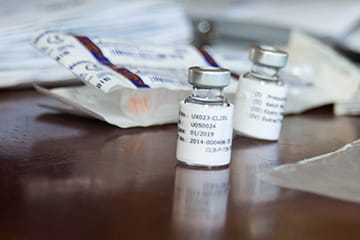Indiana University School of Medicine is a world leader in research related to hypophosphatemic rickets, a group of rare bone conditions caused by low phosphate levels in the blood.
Phosphate is a mineral critical for proper bone formation in children and bone strength in adults. When blood phosphate levels are inadequate, patients can suffer debilitating complications, including bent or bowed legs, bone pain and dental abscesses.
Decades of research led by IU School of Medicine faculty Michael Econs, MD, and Kenneth White, PhD, have led to the discovery of genes linked to hypophosphatemic rickets, elucidated the effects of mutations on these genes, and played a critical role in the development of promising new treatments.
Notably, their research provided the basis for the development of a burosumab, a new drug that was approved by the European Medicines Agency and then the US Food and Drug Administration in April 2018 for use in the treatment of X-linked hypophosphatemia (XLH). Clinical trials to test the efficacy of burosumab are led by Erik Imel, MD, and Munro Peacock, MD, DSC.







